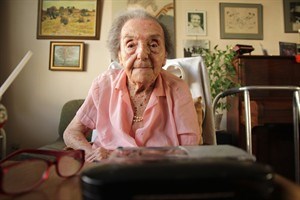
Alice Herz-Sommer, a Holocaust survivor who’s the subject of the Oscar-nominated documentary "The Lady in Number 6: Music Saved My Life,” which was made by a Canadian crew. THE CANADIAN PRESS/ho-Kieran Crilly
January 18, 2014 - 6:00 AM
TORONTO - When Montreal producer Frederic Bohbot and a documentary crew showed up to the London home of Holocaust survivor and pianist Alice Herz-Sommer in July 2010, they fretted over typical movie-making issues including lighting and cameras.
And then they heard the now-110-year-old speak on camera with a remarkable sense of optimism despite the horrors she's lived through, and learned how her love of music kept her sane while she was in a concentration camp, and it struck them how trivial their complaints were in comparison.
"That's what was so extraordinary about her, was she was very optimistic and happy," Bohbot said in a telephone interview.
"She'd say ... 'People complain and complain but it's not so terrible. No matter what you're dealing with, it's really not so terrible.'
"She believes very much that optimism was the secret to her living this long."
Bohbot and the Montreal film crew have another big reason to be optimistic these days — the moving 38-minute piece they made on Herz-Sommer is nominated for an Oscar.
"The Lady in Number 6: Music Saved My Life" is up for best short documentary, with its Oscar-winning director Malcolm Clarke and producer Nicholas Reed named in the nomination.
Bohbot, who's with Bunbury Films, said Clarke is British but has lived in Montreal since the mid-'90s. Reed is also British and lives in Los Angeles.
The doc isn't technically considered Canadian, because it wasn't funded by Canadians, but Bohbot said it was made fully by a crew of Canucks.
They include director of photography Kieran Crilly, editor Carl Freed and composer Luc St-Pierre, who are all from Montreal.
Bohbot said it all began when he and Clarke, who won an Oscar in '89 for directing the short doc "You Don't Have to Die," were working on another film from 2008 to 2010 that didn't come to fruition. A New York pianist who was helping them at the time told them how inspiring Herz-Sommer was and that they should do a piece on her.
Clarke spoke to Reed about it, secured funding and called up someone who knew Herz-Sommer, who was open and willing to be filmed.
"She didn't even ask many questions," said Bohbot. "We showed up with a camera, she pretty much was told we were coming but I'm not so clear that she fully retained it.
"And when we showed up she just opened her door and said, 'Yeah, come on in.'"
Herz-Sommer is said to be the second oldest person living in London, England and the world’s oldest Holocaust survivor.
Born in Prague, she became a renowned concert pianist on the advice of her father, who told her: "Learn as much as you can, because one thing they can never take away from you is what's in your head," said Bohbot.
And so it was that her music was what she focused on while she was imprisoned in the Theresienstadt concentration camp along with her six-year-old son, Raphael, who died in his 90s.
"She could visualize the notes in her head and replay it and sing it and it kept her alive," said Bohbot. "The beauty of the music and the ability to recall it all in her head in such terrible circumstances is what kept her sane, I think, and throughout her life."
Herz-Sommer, who celebrated her 110th birthday in November, lives alone in a tiny flat in central London.
Bohbot said she has grandchildren who showed her some footage from the doc during its editing stages.
He has sent her the full version of the film but he's not sure if she's seen it.
She still spends hours each day at her piano and likes to challenge herself. When she was 99, for instance, "she was bored so she went back to school," said Bohbot.
"She lost the use of one of her fingers when she was 101 and re-learned how to play Bach and Chopin from memory with one less finger."
When their cameras captured her life over a two-week period, she was "very inviting" but was reticent to play piano for them "because she didn't feel that she was playing as well as she used to and she was nervous about it being recorded," he added.
"The hardest part with her was getting her to talk about herself on some level. She even says it in the film, she thinks part of her secret to longevity on some level is being an eternal optimist and she's completely unselfish. She wanted to know everything about us all the time."
News from © The Canadian Press, 2014